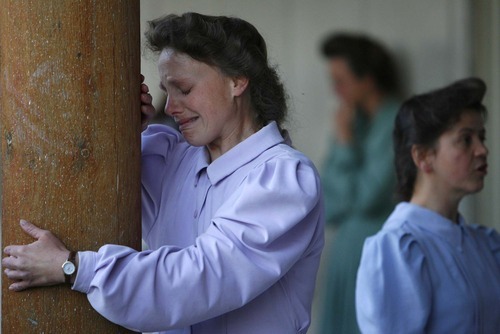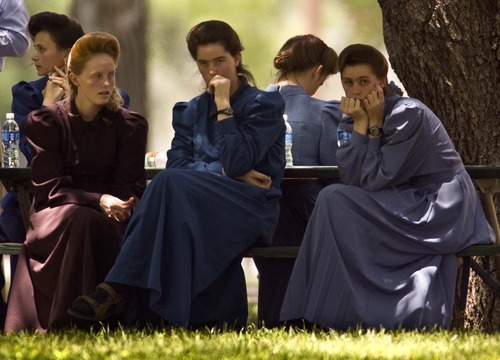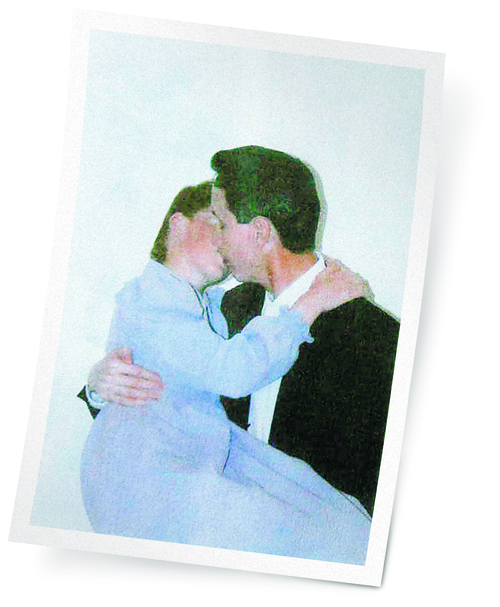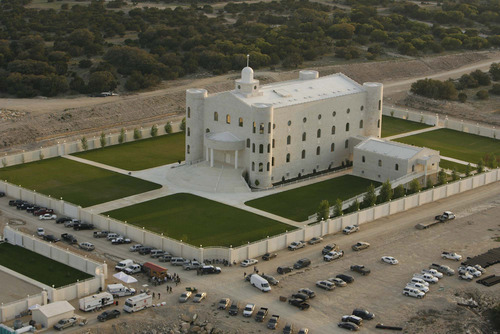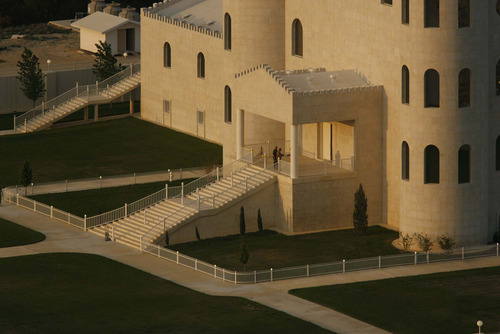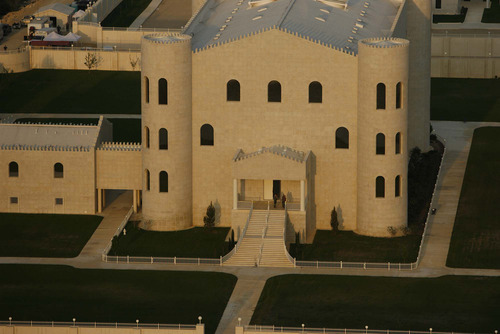This is an archived article that was published on sltrib.com in 2011, and information in the article may be outdated. It is provided only for personal research purposes and may not be reprinted.
The child's bright eyes and smooth hair make her smiling face look doll-like in the arms of the tall, gangly man. Her face is hidden in the next photo, when the 50-year-old bends his head to kiss her full on the mouth.
As a member of the polygamous Fundamentalist Church of Jesus Christ of Latter-Day Saints, the 12-year-old girl would have considered Warren Jeffs a prophet of God. Five years ago, the child allegedly became one of at least 80 of his wives.
The images could be the top of a billion-page mountain of evidence from two states likely to be laid bare when Jeffs, now 55, goes on trial Monday in Texas. Some has already trickled out, including court documents pointing to Jeffs spiritually marrying at least 10 underage girls, some as young as 12, before his 2006 arrest. Jeffs is charged with sexual assault of a child and aggravated sexual assault of a child in two of those alleged marriages, one to a girl younger than 17 and the other to the 12-year-old. A separate bigamy trial is set for October.
"There's a lot of stuff that we don't know about ... things that have taken place that will just shock and upset everyone," said private investigator Sam Brower, who has spent seven years looking into the FLDS in Utah. "My feeling is that it's time for everything to come out."
Texas prosecutors have already successfully jailed seven other FLDS men. If Jeffs is also found guilty in a trial expected to last about a month, hundreds of other alleged wrongdoings will be exposed at his sentencing.
The evidence comes from a raid executed three years ago, when Texas authorities penetrated the tall gates of the FLDS Yearning for Zion Ranch in remote Eldorado. They entered the soaring white limestone temple, searched the houses and took DNA tests of the more than 400 children living there. Authorities hauled away at least 1.7 billion pages, including marriage records, Jeffs' personal diaries, letters, lists of family members — potentially the life stories of thousands of people in at least three states and two countries.
And there's more. Prosecutors in Texas may use a trove of evidence largely unseen for five years: A stash of records from the red Cadillac Escalade Jeffs was riding in when he was arrested in Nevada.
Evidence from the raid will likely take center stage at Jeffs' trial, along with testimony from law enforcement and possibly former members of the sect. Though 78 women have been subpoenaed from the ranch — including the two victims — no active member of the sect testified at the any FLDS trials so far.
The raid on the ranch, however, was sparked by what turned out to be a hoax call for help from a Colorado woman pretending to be an abused 16-year-old wife. The hundreds of children, taken off the ranch in a massive child-welfare operation, were returned to their parents after the Texas Supreme Court ruled the state hadn't proved they were in eminent danger of abuse.
For the upcoming trial, Jeffs' defense attorneys appeared to have focused much of their fighting muscle on the raid — they've already filed 288 sealed pages seeking to have the evidence suppressed.
If they succeed, it would likely decimate the prosecution's case.
"The search, I've always believed, ranked in probably the top 10 of worst searches in U.S. history," said longtime Jeffs defense attorney Michael Piccarreta, who is not representing him in Texas but pointed out that the evidence seized there was suppressed in Arizona. "What's going on in Texas is the result of modern-day lynching."
The defense will get a suppression-of-evidence hearing, scheduled after the jury selection, which will begin Monday. But District Judge Barbara Walther heard similar arguments during a four-day 2009 suppression-of-evidence hearing in the cases of other men charged after the raid. Walther rejected the motion then and is likely to do so again.
Even before the trial starts, the courtroom has been a buzz of activity. So far, Jeffs' well-known defense attorneys have twice attempted to remove Walther on claims of bias. In what the prosecution called a delay tactic, Jeffs fired his attorney less than three weeks before the scheduled start date. If so, it didn't work. Walther on Wednesday required that at least five attorneys retained to represent him stay on.
It could all be part of the defense strategy, said Baylor University adjunct professor and appellate lawyer Greg White.
"To make the prosecution do everything exactly right, and to fight everything the prosecution says is a well-honored tradition," he said. "The first slipup they make is going to get pounced on."
Once the trial begins, a possible defense argument is religious freedom, that Jeffs was unfairly targeted because of a deeply held religious belief in polygamy. That argument may hold some water in Texas, where people generally respect the right to be left alone, White said.
"This intersection between what people want to do on their property in their own religious beliefs and the government coming in and telling you what to do ... a good segment of the population generally believes ... it's none of your business," he said.
Then again, Texas juries don't exactly soft pedal sex crimes, he said. Juries have handed out heavy sentences to some of the other FLDS men who have gone to trial so far, including one for 75 years in prison.
Those previous trials, however, have been somewhat one-sided, as no member of the FLDS has spoken. They have kept their sect's secrets.
"There's been no live testimony from anyone as to anything that's happened on the compound, as to what they saw and witnessed," said University of Texas professor John Sampson, who has been called to testify on the state's marriage law. Five are awaiting trial
Of the 12 men charged, five have been found guilty, primarily on the strength of birth certificates, photos and DNA testing. Two men have taken no-contest pleas and are continuing to argue on appeal that the raid was illegal.
If Jeffs is also found guilty, another 700 so-called bad acts alleged against him may become public during the Texas process of sentencing by jury.
Some have already come out in Texas courts and in Canada, where a judge is weighing whether to strike down the country's law banning polygamy. In two filings with the Canadian court, Texas Ranger Nick Hanna laid out marriage records and personal dictations pointing to Jeffs allegedly marrying six more girls from the U.S. and Canada, some as young as 12 years old.
Some were allegedly trafficked across the Canadian border from an FLDS settlement in British Columbia.
Two more sets of photos depicting two other then-13-year-old girls apparently wedded to Jeffs surfaced in hearings after the Texas raid.
That adds up to a total of at least 10 allegations of underage marriage.
Only two are the subject of the trial set to begin Monday, perhaps because there is not sufficient evidence that a crime took place in Texas — some marriages allegedly took place in Utah and Arizona.
But the threshold for introducing bad acts during sentencing is much lower than for filing criminal charges, White said.
"Everything in your past is now fair game," he said. Even a slip of the tongue can become sentencing fodder. And in the Jeffs case, "I would expect they've collected a notebook full of things that the man on the street would recoil at."
lwhitehurst@sltrib.comTwitter: @lindsaywhitehurstsltrib.com/blogs/polygblog —
Jeffs charges in Utah vs. Texas
Four years ago, Jeffs was convicted of being an accomplice to the rape of a 14-year-old girl in Utah because he presided over her unwilling marriage to her 19-year-old cousin. That conviction was overturned last year and he was extradited to Texas. The charges against him there are crimes he is directly alleged to have committed — potentially an easier crime to prosecute and make stick, according to University of Utah professor Daniel Medwed.



